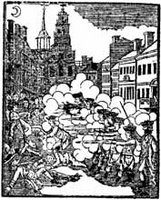Colonial Boston Vocabulary: "little-house"
 Here's a bit of the transcript of the trial of soldiers for the shootings known as the Boston Massacre. Ropemaker Nicholas Ferreter was asked about trouble three days before at Gray's rope-making factory, on 2 Mar 1770.
Here's a bit of the transcript of the trial of soldiers for the shootings known as the Boston Massacre. Ropemaker Nicholas Ferreter was asked about trouble three days before at Gray's rope-making factory, on 2 Mar 1770.
...there was one of our hands while I was coiling a cable, said to a soldier do you want work, yes, says the soldier I do faith; well said he to the soldier, go clean my little-house, he damned us and made a blow at, and struck me, when I knocked up his heels, his coat flew open, and out dropt a naked cutlass, which I took up and carried off with me. He went away, and came back with a dozen soldiers with himOff-duty British soldiers were allowed to work for pay, and historians believe they charged less for their labor than locals because the army was providing their basics. This economic competition exacerbated the resentment that many Bostonians already felt toward the soldiers.
As for the term "little-house," there are more clues about what that meant in this July 1770 deposition from Thomas Walker, drummer for the 29th regiment:
...he met Patrick Walker Soldier in sd. Regiment, in the Street cut & bleeding very much, that he asked sd. Walker Who had used him so, that he told him that he was served in that manner by the Rope Makers, that he then asked him What was their Reason for so doing, upon which he informed Him that as he Wint for a Buckett of Water to a Yard Adjacent to the Rope Walk he was asked by one of the Rope Makers if he would Work he reply'd he would, asking him What he was to Work at.And in more earthy terms, we have an account of the insult from Samuel Bostwick, dated 19 March:
To whom the Rope maker reply'd to Empty his Necessary House.
To which sd. Walker reply'd, that if he had no other Work he might Empty it himself, as he thought it beneath a Soldier, to be Guilty of so Scandalous & Servile an Office upon which they argued for some time, but at Length fell to blows.
...three soldiers of the 29th regiment, came up Mr. Gray's ropewalk, and William Green, one of the hands, spoke to them, saying, "soldier, will you work?"The ensuing brawl led to two more days of running fights between locals and soldiers (with Sunday off for the Sabbath, of course). Those fights in turn became one of the triggers for the shootings on King Street on the 5th. One ropemaker was shot dead, and two soldiers who had been at the ropewalk were tried for murder.
The soldier replied, "yes."
Green said, "then go clean my s--t-house."
The soldier swore by the Holy Ghost that he would have recompense, and tarried a good while swearing at Green, who took no further notice of him, and then went off, and soon after returned to the ropewalk with a party of thirty or forty soldiers, with a tall negro drummer [Thomas Walker], and challenged the rope makers to come out.
Ferreter's testimony appears in the transcript of the soldiers' trial, reprinted in The Legal Papers of John Adams. Walker's deposition is filed in the British National Archives. Bostwick's account, strategically placed hyphens and all, is in Boston's report on the shootings, titled A Short Narrative of the Horrid Massacre.

No comments:
Post a Comment